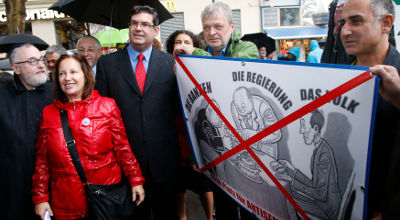Incidents Make Jews Wary, 75 Years After Hitler Annexed Austria
Marina Plistiev, a Kyrgyzstan-born Jew, has lived in Vienna for 34 years but still doesn’t like to take public transport.
She recalls the day in 1986 as a teenager when she and her 4-year-old brother, whom she’d collected from school with a fever, were told to get off a tram for having the wrong tickets, and nobody stuck up for them, apparently because they were Jews.
“With me (now), you don’t see I’m Jewish but with my children you see that they’re Jews. They get funny looks,” she told Reuters at Kosherland, the grocery store that she and her husband started 13 years ago.
While Austria is one of the world’s wealthiest, most law-abiding and stable democracies, the anti-Semitism that Plistiev senses quietly lingers in a nation that was once a enthusiastic executor of Nazi Germany’s Holocaust against Jews.
After decades of airbrushing it out of history, Austria has come a long way in acknowledging its Nazi past, and the 75th anniversary on Tuesday of its annexation by Hitler’s Third Reich will be the occasion for various soul-searching ceremonies.
But Jewish leaders who fought hard to win restitution after World War Two are on guard against a rising trend in anti-Semitic incidents, occasionally condemned by Austrian political leaders but seen more generally as a regrettable fact of life.
Austrian Jews have grown more vigilant as hooligans have verbally abused a rabbi, Austria’s popular far-right party chief posted a cartoon widely seen as suggestively anti-Semitic, and a debate has opened on the legality of infant male circumcision.
A new poll timed to coincide with the anniversary found that three of five Austrians want a “strong man” to lead the country and two out of five think things were not all bad under Adolf Hitler. That was more than in previous surveys.
The history of Vienna – once home to Jewish luminaries of 20th-century culture such as Sigmund Freud, Ludwig Wittgenstein and Arnold Schoenberg, but later Adolf Eichmann’s testing ground for what would become the “Final Solution” that led to genocide of 6 million Jews – means its Jews are always on the alert.
Holocaust Perfected in Vienna
“Vienna was a very important place for the fate of all European Jews because the automated driving out of Jews was perfected here,” Joachim Riedl, author of several books on Jewish history and Vienna, said at a recent lecture.
Other incidents further afield have heightened concerns. A radical Islamist gunman killed four Jews in France before being shot dead, Hungary’s far-right leader called for a list of prominent Jews to be drawn up help protect national security, and Jewish cemeteries have been desecrated in Austria’s eastern neighbor.
Seeking to avoid being forever branded as the country that welcomed absorption by the Third Reich and refused to atone for it, Austria has made gestures to underline its disowning of both the Nazi past and previous manifestations of anti-Semitism.
Last year, Vienna renamed part of the elegant Ringstrasse boulevard circling the inner city that had been named after Karl Lueger, the mayor who modernized Vienna in the 19th century but became popular for his anti-Semitic rhetoric.
“We cannot choose our history,” said parliament president Barbara Prammer. “We must bear this responsibility.”
Rabbi Andrew Baker of the American Jewish Committee, a global advocacy group, has seen a marked change since a 1991 poll that he helped design found that most Austrians thought it was time to put the memories of the Holocaust behind them.
“There was still a social anti-Semitism that kind of defied embarrassment,” he said. “The Austrians have come a long way since then, but they had a long way to go.”
Today’s Austrian Jewish community of 15,000 is diverse, formed mainly of post-war immigrants from eastern Europe and the former Soviet Union.
“This city is something very remarkable. It has a great Jewish history and a great Jewish community, but they have little to do with one another,” said Israeli-born writer and historian Doron Rabinovici, who has lived in Vienna since 1964.














































